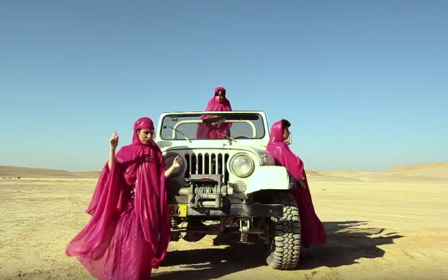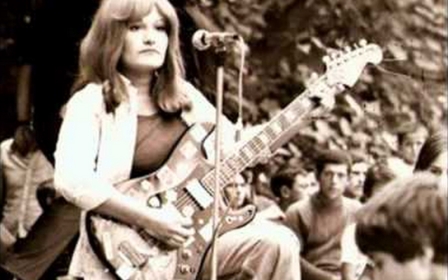Being a Saudi pop wannabe in LA ain't easy

NEW YORK, United States – Rotana Tarabzouni gets it from both sides.
To conservatives in Saudi Arabia, she is a loose-living singer who snubs her culture by performing in dimly lit nightclubs. In Los Angeles, her new home, US media outlets are more interested in discussing her burqa-free wardrobe than her voice.
That is a shame, because Tarabzouni can really belt out a tune. In her cover version of Real by Years and Years, or her own song, Down For You, she purrs in a potent, sultry tone that hints at what she hopes to achieve.
“I want to be the first Saudi female singer to break into the music industry. I won’t settle for anything less than a global platform because the issues that I speak of, I need the world to hear them,” she told Middle East Eye.
“I’m not just doing this for Saudi Arabia. I want the West to have a more accurate picture of what it means to be a Saudi or Arab woman. To build a bridge of understanding that the media does not facilitate.”
She is having a rough ride.
Like many Gulf nationals who embrace Western culture, Tarabzouni is denounced for abandoning Islam and Saudi values by traditionalists, who warn that their society is being eroded by permissive, secular forces from overseas.
In an article about Tarabzouni, Arab News, a Saudi newspaper, said female vocalists are seen as a “social pariah by many” in the kingdom. The fact that Tarabzouni does not croon at weddings, but sings in English in Los Angeles nightspots wearing negligees, adds insult to injury.
Harsher words come via social media. Online pundits typically praise her courage and a sensual voice that leaves them prickling with goose bumps. Others blast her as a “shameful Westernised female” who “ought to be killed if she is a Saudi”.
“A lot of people are offended by what I do. If you had asked me a year and a half ago about what has been said about me, I would have said yes that it upset me. But it doesn’t upset me anymore,” she told MEE.
“When you’re 100 percent unapologetically yourself, it can force others to meet parts of themselves they aren’t ready to meet. That can be confusing and challenging and a lot of people don’t know what to do with it, so they get angry.”
While she tests assumptions of people back home, she also has issues with Californians.
Western journalists typically present her as a young woman who suffered under Saudi Arabia’s strict culture and dress rules and had to leave the realm to enjoy the liberties that Americans take for granted.
When writing about Tarabzouni, LA Weekly, a tabloid, referred to the Islamic head-covering that is seemingly obligatory when reporting on Muslim women. Its hackneyed headline described her as: “Veiled in silence in Saudi Arabia.”
Public Radio International, a Minneapolis-based network, focused on the controversy her lifestyle has caused back home by recounting blasphemy accusations and the snarling critic who branded her “a slut” who should “burn in hell”.
“Western media is very much fixated on how I came from Saudi, where I was depressed, and then I moved to the US, where all of a sudden I was liberated. And I say repeatedly that, for me, that is not the case,” she said.
“There is a very narrow understanding of what it means to be an Arab, Muslim woman.”
Her decision to leave Saudi Arabia had less to do with conservatism than the lack of music venues and record labels there. She wants to compete with Katy Perry and Lana Del Rey, which is more easily achieved by singing in English in California, she says.
Her choice to relocate came only recently.
She was raised by open-minded parents in Dhahran, in eastern Saudi Arabia. While her dad was rocking out to Led Zeppelin and the Beatles, Tarabzouni was in her bedroom, singing Celine Dion and Christina Aguilera tunes into her hairbrush.
But becoming a pop star was a pipe-dream for children in the desert kingdom’s oil capital. Instead, she played by the rules, worked hard at school and took a job with the public relations wing of hydrocarbon giant Saudi Aramco.
Her switch back to music came almost by chance.
At the end of her undergraduate degree in Boston, she tried her luck at an open casting call alongside some 200 other hopefuls. Her rendition of Come Together by the Beatles brought the casting director to tears.
“It was the first time in my life I had ever seen anyone have an emotional reaction to my voice and I don’t know what it was, but there was just a switch that switched after that and I couldn’t stop thinking about it,” she said.
After months of mulling, she took the leap of faith in January 2013 and joined the Los Angeles music scene. She currently plays a handful of shows at such venues as the Viper Room and the Whisky a Go Go each month.
She is working towards the release of her debut EP and is set to return to the Gulf in February to perform at NYU Abu Dhabi.
Friends and relatives talk about Tarabzouni’s dedication and strong work ethic.
“When I first met Rotana she was just starting out in the music industry,” Carrie Haber, a pop musician who has worked with Tarabzouni, told MEE.
“There was an energy about her. She was so curious about everything and so determined to learn. But even though she had a lot to learn there was a fire, an undeniable strength in her that you don’t often come across.”
Haber describes her friend as a “star in the making”. Despite these accolades, there have been hiccups along the way.
In 2013, when the Women2Drive campaign against Saudi’s men-only motoring rules was gathering momentum, Tarabzouni released a cover of Team by Lorde on YouTube that has been viewed over 350,000 times.
She changed some lyrics so her version praised the motoring women protestors, singing: “We live in cities you won’t see on screen/Not very pretty but we sure know how to drive free.”
As well as encouragement, Tarabzouni received hate mail and online denunciations. In a separate furore, she decided to stop performing a song about religion that was too controversial for some listeners.
Though she draws ire from some older Arabs, Tarabzouni says she is paving the way for millennial-generation Saudis, who, she says, are among her biggest fans and often want to emulate her taboo-busting lifestyle.
“Every Saudi individual who is unapologetically being herself in 2015 is building the infrastructure for the generation after us to have a home. I didn’t feel like I fit into the Saudi norms of my parents’ generation, but I am not an American either,” she said.
“I’m an entity in-between, there’s no home for that yet.”
Middle East Eye propose une couverture et une analyse indépendantes et incomparables du Moyen-Orient, de l’Afrique du Nord et d’autres régions du monde. Pour en savoir plus sur la reprise de ce contenu et les frais qui s’appliquent, veuillez remplir ce formulaire [en anglais]. Pour en savoir plus sur MEE, cliquez ici [en anglais].




